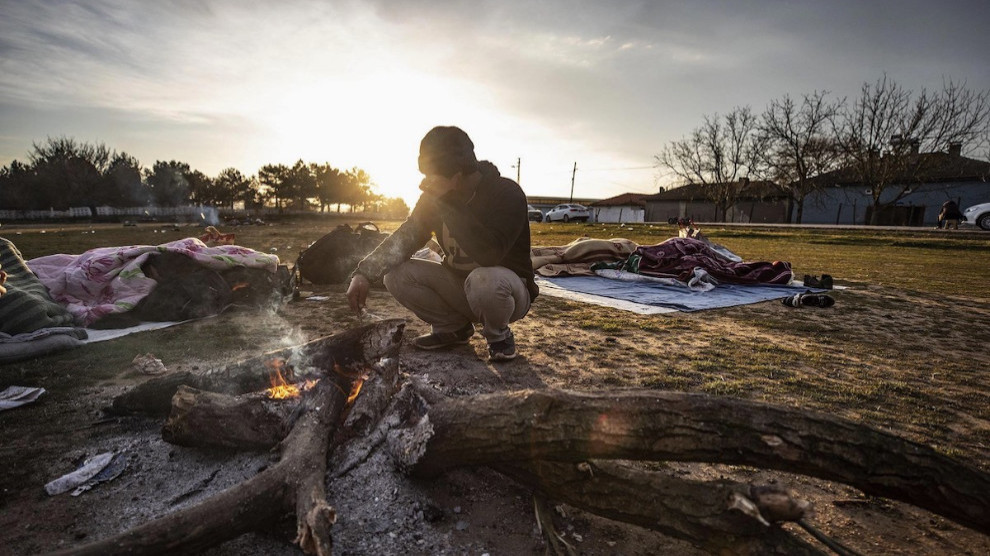The drama of the refugees brought by the Turkish regime to the border with the EU with false promises has no end. ANF spoke to human rights activist Leman Yurtsever and social worker Berfin Ateşmen about their observations on the ground.
"People are kept in a hopeless situation"
Yurtsever tells the following on the situation in Edirne: "We met people who were desperately waiting in groups together near the borders. The people were not allowed to shelter in the bus station, so they lit a fire outside to warm up. The majority of those gathered were women and children. There were pregnant women, sick and also disabled people. None of them has a blanket in the field, we saw children without shoes. They were people from Syria, Afghanistan, Iran and Uzbekistan. They had heard on television and the social media that the borders had been opened and they had come here from all around Turkey.”

Increasing racism after the killing of Turkish soldiers in Idlib
The refugees repeatedly told Yurtsever that they were on their way to Europe in search of a dignified life. In Turkey, they had temporary residence status, if at all, and were humiliated, marginalized and used to work for starvation wages in every sphere of life. Yurtsever continues: "The people we spoke to told us that, especially after the killing of Turkish soldiers in Idlib, they were insulted and treated in a hostile manner even by their dearest neighbours, who considered them to be honest people. Some people were told to 'go away' and they were physically attacked. These incidents are not often brought up because refugees are afraid of further attacks. A refugee who had previously been in Samsun was racially abused and threatened by his neighbour. An Afghan refugee reported that he had not received a wage from his boss and when he asked for it, the boss told him: 'Get out, there is no money for you, you have killed our soldiers. While we were talking to the people, they asked again and again: ‘Aren't we human?’ They declared that they had fled to Turkey before the war, but that they were marginalized here and had no social rights whatsoever.
Repression by the police and gendarmerie at the border
Yurtsever reports that there are only three portable toilets on the grounds of Edirne bus station, where hundreds of people are staying, and that three Turkish liras are collected from refugees for their use. Although there is enough space in the bus station to accommodate the refugees, they are not allowed into the building and they have to fight for survival with their children in the cold outdoors. The people are provided with food and drink by NGOs, but there are not enough blankets and food. There are repeated attacks by the security forces, Yurtsever reports and continues: "While the army and police do not touch the refugeesduring the day when the press is there, attacks take place at night. The police try to drive the refugees away from the bus station by threatening them.
"Life threatening situation for refugees at the border"
From the Pazarkule border crossing, Yurtsever reports that the people who have gathered here between the police and the press have been waiting for days without blankets on the bare floor at the border. No supplies are allowed into the military restricted area. She describes the situation of refugees as acutely life-threatening. Yurtsever emphasizes that the refugees in Turkey also have no place to stay and continues: "They have given up their apartments, distributed or sold all their possessions, they have gone to the border to never return. They are now told that they should return, but where are they supposed to go? They are stuck in a limbo. This is a matter of life and death. Those who make it across the Greek border will be stripped stark naked by the Greek soldiers and sent back to Turkey."
"Making refugees a bargaining chip is a crime against humanity"
Yurtsever sharply criticizes both the Turkish government and the EU and calls for an immediate opening of the border. Turkey must also finally ratify the Geneva Convention in its entirety and give these people the refugee status they are entitled to, she says.
"They do not want wealth, they just want to live humanely"
Social worker Berfin Ateşmen describes the situation in Edirne as "worse than 2015". She tells: "They fled the war and sought shelter in Turkey, but were exposed to racism and assaults there. They were treated as cheap labour and could not make a living. They say they want bread only to survive. They do not want wealth, but to live humanely. That is what they told us. They left because they found no shelter here. When I said it was dangerous to go to the border, I got the same answer over and over again: 'We are dying day after day anyway, we are maltreated and insulted every day'. A refugee from Kayseri told how his wife was beaten before his eyes and that this was the most shameful situation in his life. Another refugee said that he was newly married but could not provide for his family. Another told how he and his wife and children were driven into the Evros by security forces. Again and again they say: 'Life in Turkey is very hard, we struggle to stay alive. We do not know when our home will be attacked. It is the same at the border. Either we die or we live a dignified life. They want the world to know about this drama."
















